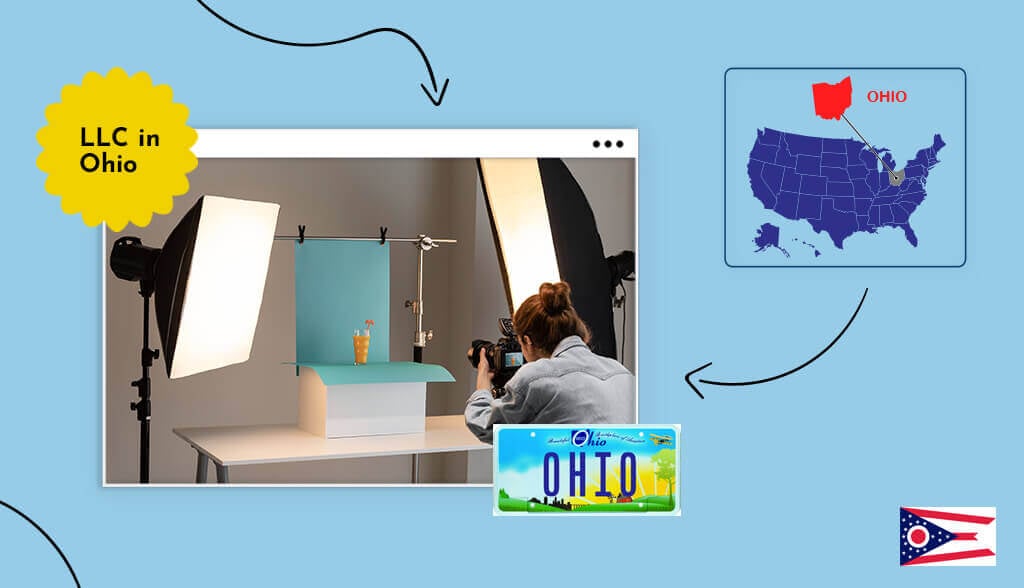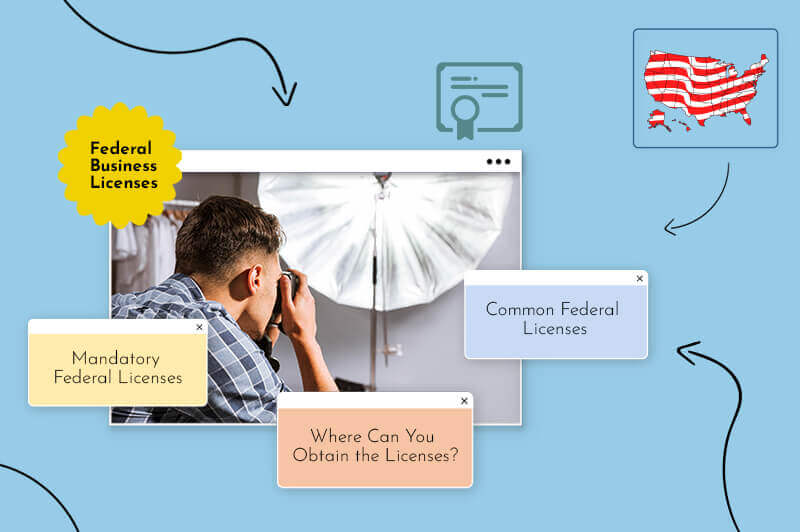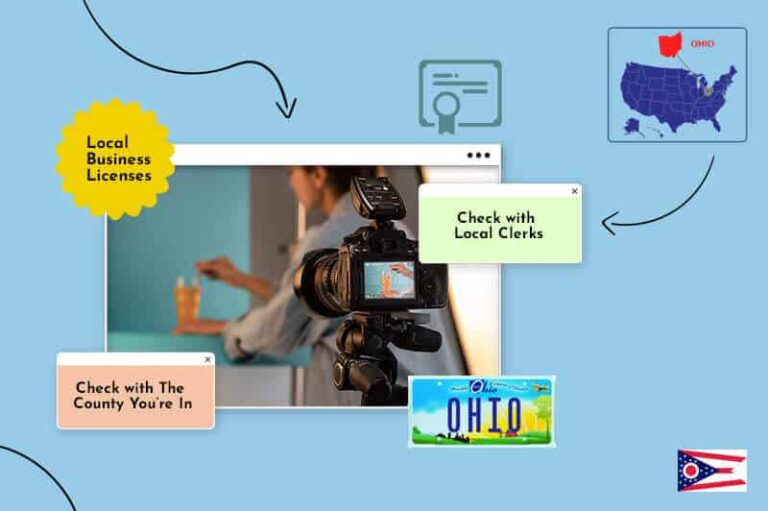
When you want to start a business in Ohio, one of the first things you’ll be looking into is getting a business license. Depending on the kind of business you’re planning, you may need local, state, and federal licenses to be in compliance. Some smaller businesses and sole proprietorships will need fewer licenses, while corporations will need more. Banking, medical, financial, and related sectors may also have more specific requirements for getting an Ohio business license.
If you’re forming an LLC in Ohio, it’s pretty easy to do in the Buckeye State. You’ll select a name for your business, choose a registered agent, and file your articles of organization. You’ll also need to get an EIN, and then you can open bank accounts and other needed options under your business name, so you can get started. After all is set and done – there are business licenses and permits required by the state of Ohio to begin operating. Let’s learn what they are.

Business licenses are issued by the State of Ohio or by a city, county, or other local municipality. They provide important information about your business and let customers know that you’re legally allowed to transact within the state. Getting a business license (or licenses, in some cases) is a great way to get started on your new business venture. It can also be required if you want to open a bank account under the business’s name.
Permits are similar to business licenses, but they aren’t quite the same. When you get a permit, it’s generally for a specific event, date, or activity. You may need a permit for selling alcohol, for example, but you won’t need a permit to open a bar. Instead, you’ll need a business license for the actual establishment. It’s very important to make sure you have the right permits for any additional activities your business undertakes so you don’t end up with any issues.
Registering for a license or permit is easy. Ohio has a portal where you can get the information you need and sign up for the right licenses and permits. You can be sure you have what works for you, and you won’t be at any legal risk when you open your business and get started selling. Depending on the kind of business you have, you might need to register for more than one license or permit. Getting them all in one place makes it easier.
If you don’t get a business license, but you’re supposed to, you can’t legally do business. That’s true not only at the state level but also at the local level. For example, if you need a state business license and one for the city where you’re working, you need to have both in place before you get started. That will reduce any chances that you could be fined for not having the right licenses and also helps protect you and your customers based on legal liability. The same is true with the permitting process.

Make sure you’re not just setting up your business with the State of Ohio and then providing goods or services. A lot of towns and other municipalities also require you to have a license through them, as well. You can find that information online or by calling the local government where you’re planning on running your business. Keep in mind that if you travel for your business, you’ll likely need a local license for every city or town where you’ll be conducting that business, not just your primary location.
Local clerks are the best way to find out about Ohio licenses and permits. They can give you specific information for that local area because it’s their job and they’re familiar with it. Asking in other areas might not provide the quality of information you need or want since a clerk in one location won’t necessarily know about what other locations are doing. The kind of business you have also matters when it comes to whether you need local business licenses.
It’s not just the city or town you’re working out of that you need to consider. Local business licenses can also include counties and unincorporated areas, such as townships or census-designed areas. These are less likely to require a local license than an established, incorporated city, but that doesn’t mean they all follow the same rules. By checking with your county, you’ll be less likely to miss out on something important that could leave you accidentally noncompliant.

The State of Ohio requires almost every business to be licensed. There are some exceptions for sole proprietors and small businesses (who still may need local licenses), but an LLC or other corporation will definitely want to look at the kind of Ohio business license they need. Understanding what licenses you need can make it easier to get your business operational so you can get started bringing in customers and revenue.
A seller’s permit is similar to a state business license. It’s required if you engage in business in Ohio or you’re selling tangible personal property. You want to make sure to apply for this permit before you start doing business, because you need to have it in place before your first sale. You can get into legal trouble if you’re selling tangible goods in Ohio without a valid seller’s permit. Naturally, you want to start your business off on the right foot, and that means all the required permits and licenses.
Ohio offers some different options to apply for a seller’s permit, depending on whether you have a physical location in Ohio or you simply want to conduct business there. You can use the online portal to get information about in-state and out-of-state seller’s permits. Not only does that give you the knowledge you need, but it also helps you make sure you’re getting the right permit for your specific business. The wrong permit is basically the same as not having a permit at all.
A vendor license is issued by the County Auditor, and costs $25 for an in-state business with a physical location in Ohio. A transient vendor doing business in Ohio only briefly will pay the same amount, while an out-of-state seller can obtain a vendor license without a fee. The license stays good once it’s issued, and isn’t subject to yearly renewal. Sales taxes collected on the sale of goods need to be paid monthly for most businesses.
Ohio is a business-friendly state, and doesn’t require a lot of licensing at the state level. If you’re part of a more closely regulated group, though, you may need additional licensing. Banking and finance, construction, law, and medical are some of the most common areas where you’ll need to make sure you have all the licensing expected of you at the state level.
It’s not that common to need a federal business license because how and where you do business is mostly regulated by the state where you live. But there are some types of transactions that are regulated at the federal level, and you’ll need to get a federal license if you want to engage in those kinds of businesses in the state of Ohio.
If you’re dealing with a regulated area, such as alcohol, firearms, aviation, or agriculture, you can expect to need federal-level licensing. These licenses are mandatory because of the level of regulation businesses have when they engage in these kinds of activities. If you’re not sure whether you need a federal license for your business, you can check with the potential issuing agency for full information.
Generally, you can get the license through the relevant regulating agency. That might be the FCC, the ATF, or another agency that regulates your particular type of business. Having a federal license in place may be required for you to get your Ohio license, since these kinds of businesses are much more heavily regulated than others. Common federal licenses include those for firearms dealers, commercial aviation, interstate transport, and alcohol.
To file for an Ohio business license, you will search for your particular type of business or industry. Then you can fill out the application and either mail it in or submit it online. If you’re in a hurry, online is best. It can take up to six weeks for mail-in applications to be processed. The state also offers detailed information about how to apply, depending on the kind of business you have. Some types of businesses even have checklists you can use to ensure you haven’t missed anything important.
While it’s not difficult to get a business license in Ohio, you do need to make sure you’re taking it seriously and getting all the licenses and permits you need for your company. You don’t want to overlook something that could be very important to successfully (and legally) operating your business in the state. With some focus and a little bit of time, you can get all the licenses and permits required and start selling to customers to grow your business faster.
This portion of our website is for informational purposes only. Tailor Brands is not a law firm, and none of the information on this website constitutes or is intended to convey legal advice. All statements, opinions, recommendations, and conclusions are solely the expression of the author and provided on an as-is basis. Accordingly, Tailor Brands is not responsible for the information and/or its accuracy or completeness. It also does not indicate any affiliation between Tailor Brands and any other brands, services or logos.
Products
Resources
@2024 Copyright Tailor Brands